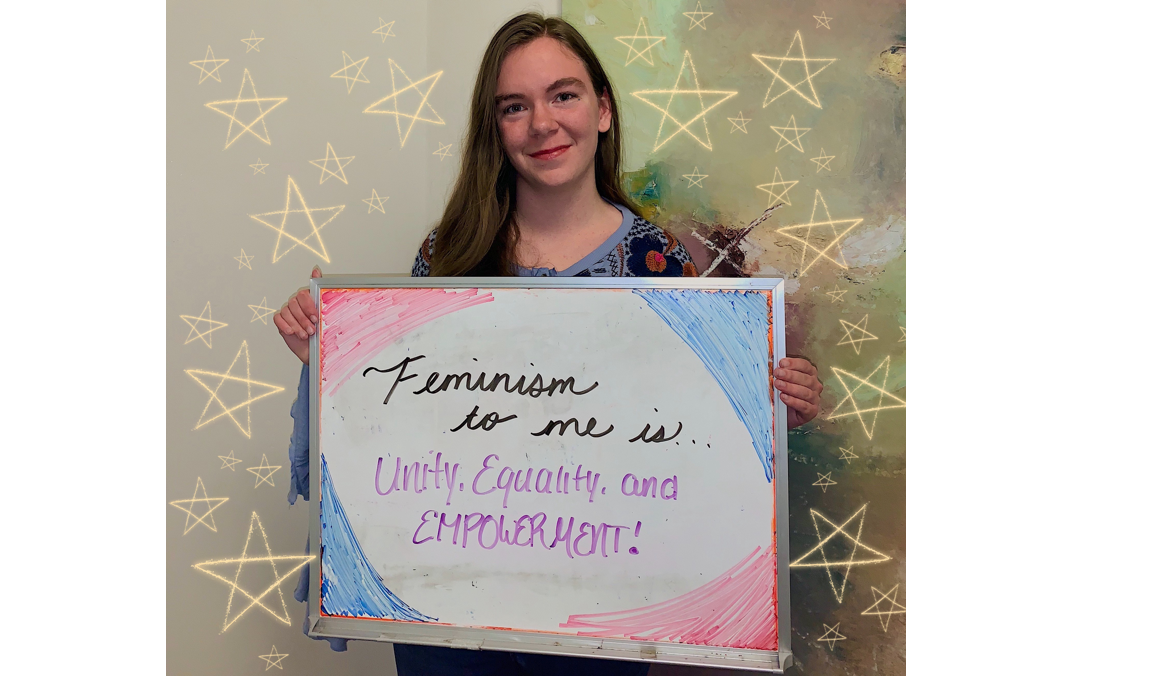Featured UCLA Feminist: Jordan Holman

Photo by Deirdre Mitchell
Feminism is a concept that came with the accumulation of information or the development in age for most people. However, for Jordan Holman, feminism has been a constant throughout her life. Growing up in a progressive town with strong female role models, it has never been a question of whether or not she was a feminist — but what this identity meant and how she could use feminism to benefit others. Coming into UCLA as a first-year English major, Holman has continued to expand her definition of feminism and lift people up as a result of it.
Born in Marin County, California, Holman definitely attributes a lot of her views to growing up in a liberal county outside of San Francisco. With a strong, independent, and career-oriented mother and grandmother, she was fortunately raised in a place where she felt confident in her abilities and encouraged in her pursuits. Even as a child in the San Francisco Ballet, Holman recalls the love and support her family and home gave her.
Dance was one of the first times that she’d experienced the demanding pressures society places on girls —pressure to view each other as competition rather than a community. When reflecting on this, Holman said, “Women should raise each other up. We need to be unified in that sense and look out for each other and not just ourselves.”
“So, I never even questioned the word feminism and what [it meant] until I got into high school, and that is when I realized [I was a feminist],” Holman said. In fact, she really didn’t think much about the term until she saw how divided the country was during the 2016 elections. This made her realize how important it was to be informed and involved because even if she herself has always been surrounded by progressive values, there are different views that exist beyond the bubble. After her realization, she really took a step back and analyzed her own beliefs and actions, looking to see what more she could do to improve the immediate community around her. Expanding on what feminism started to mean to her, she said, “How can I be the best woman I can be and crush patriarchal views, but also not to forget to look to my neighbor on my way up?”
Even as a student in high school, Jordan took the effort to make sure the work that she was doing was meaningful and actually promoted equality. As a leader, she was the president of a club fundraising for girls’ high school education in Kenya. Upon hearing about this club, I couldn’t help but bring up white saviorism and unwarranted Westernization of culture. Immediately, Jordan recognized this and went in to further detail about how the Kenyan school was founded by Kenyan women for girls who weren’t expected to exceed middle school education and instead be cast off into marriage. “I never want to actively contribute to the ‘white Savior’ mentality and being aware of it is a good baseline to start,” she said.
For Holman, the experience of learning about the lives of these young girls and their culture was valuable and eye-opening. “It really made me put the opportunities and advantages I’ve had in my life into perspective. [Being able to have] an education and [go to] college was something I definitely took for granted,” she said. “I have so much privilege in that I grew up in a liberal and inclusive space, that I am not a first-generation student, that I am fortunate to have had these opportunities, and privilege from my [white] race and sexuality. So, it matters how can I use my opportunities for good and not exploit the fact that I came from a privileged place.” A major aspect of Jordan’s feminism now stems from the ability to recognize the privilege in her own life as a white, straight, cisgendered woman from an academic background, and she tries to use this position of privilege to be an ally to other marginalized groups.
Additionally, as the editor of her school’s newspaper, Jordan used this platform to promote her opinions and raise questions about equality. Specifically, she decided to write an article and research about why her school had never had a female motivational speaker and why her principle felt the need to push that statistic aside. It was small things like this that made Jordan realize that there was always more to do as a feminist to try and raise everyone to the same level. “If I do go into journalism and writing, I want to use that platform to highlight women in careers and learn how can I use my passion [of writing] to move the movement forward,” she said.
After entering college, Jordan furthered her work in journalism by immediately joining the Daily Bruin’s Arts & Entertainment Department and continuing her work with girl’s education by joining She’s the First. Moreover, she wanted a community of strong diverse women within the chaotic and crowded atmosphere, which is why she joined the Bruin Belles. For her, being surrounded by passionate and powerful women who help others and promote acceptance provides a safe space where she can openly discuss social issues and politics without fear of being overlooked or underestimated in her thoughts.
“Feminism is equality, right? The intersectionality of it is often missing.” Holman continued, “I think that a big piece that is often lost is how can we make [feminism] the most intersectional possible. We need to remember that we are not free until every woman and person is free with race, sexuality, and gender identity.”




